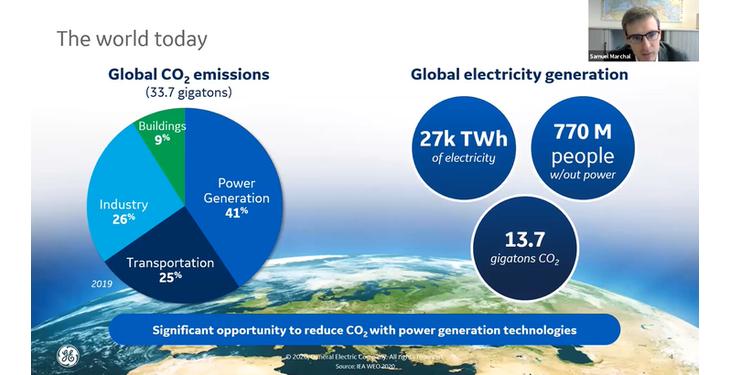GE has been present for many years in Romania, with good references and ongoing projects, and it has good understanding of the country characteristics. Ready to support the state and companies to move into the decarbonization of the power generation and utilities sectors, GE sees natural gas as the transition fuel, when used in state-of-the-art technologies.
As a speaker at Energynomics online conference for “Decarbonization of the national energy sector – challenges and solutions”, Samuel Marchal, Senior Sales Manager GE Power, Gas Power Systems, started with an overview of the current generation mix worldwide. Coal-based power generation lead the way, today, but it will increasingly be under pressure and declining, as renewable energy, mostly solar and wind, will grow drastically. However, the gas will remain very important and resilient, he believes.
“We see a drop in coal and gas production, due to the impact of the current sanitary crisis, but gas will be resilient and recovering after this crisis. Coal will be under pressure and continue to transition to both renewable and gas”, said Samuel Marchal.
The case for natural gas
A picture of the current situation, worldwide, shows there are today over 33 gigatons of CO2 emissions, mainly from power generation (41%). “The CO2 emissions have increased in the last 20 years by more than 40%, from 23, to 33 gigatons”, Marchal underlined. “It means that the technology will have to play a significant role to reduce the CO2 emissions in the power generation.”
GE Power representative answered to a question frequently addressed these days – “Do we still need fossil fuel?”. Based on 2019 estimations, the electricity demand will grow significantly in the next decades. “The current electricity generation is about 27 thousands terawatt hour per year (TWh/y); if we consider a scenario with a demand increase of 1.7 percent per year until 2040, we reach about 38-39 thousands TWh/year. If we consider that the production from renewable will double from the situation today, solar and wind will heavily support the decarbonization and the growth of demand. However, we still see a gap of approximatively 17%, 6.700 thousands terawatt hour a year, which need to be filled in by fossil fuel, most probably, and by gas, especially”, he said. “This is where we are positioning the gas technology for the power generation. Our message today is that gas turbines are integrally part of the power system and will continue to play a role.”
The case for technology
“Today there are also 1.3 billion people not having constant access to electricity and even 770 million people not having access to power at all. This means that the demand will continue to grow. It is the technology that will be supporting both at the same time – the growth of the demand, and also reducing the increase of the CO2 emissions”, said Samuel Marchal.
He then presented the example of the U.S. power sector in the last 10-13 years. “Since 2007, to be precise, the emissions have been reduced by 33% and this is in part due to renewable (30%), but 40% of this reduction is due to the fact that they are transitioning from coal to gas. This is a good example to show that we can already reduce the CO2 emissions with the gas technology, by transitioning from coal to gas.”
More than that, he added, the gas technology have some important characteristics and properties which are very important for the power generation system as well: it is flexible, so you can run to compensate renewables when they are not available; it has very fast start times and ramp rates: it has a low turndown, which is providing a system inertia to support the system services, as well, and providing security and safety for the grid.
“Technology is really having a key role to play and this is why we, GE, a technology provider, are developing and investing heavily into the energy transition and new decarbonization pathway. Our goal is to provide technology today and tomorrow for a society demanding aggressive action to address climate change”, Samuel Marchal said.
The conference “Decarbonization of the national energy sector – challenges and solutions” was organized by Energynomics with the support of our partners EnergoBit, GE, Hidroelectrica, Kawasaki Gas Turbines, Siemens Energy.
